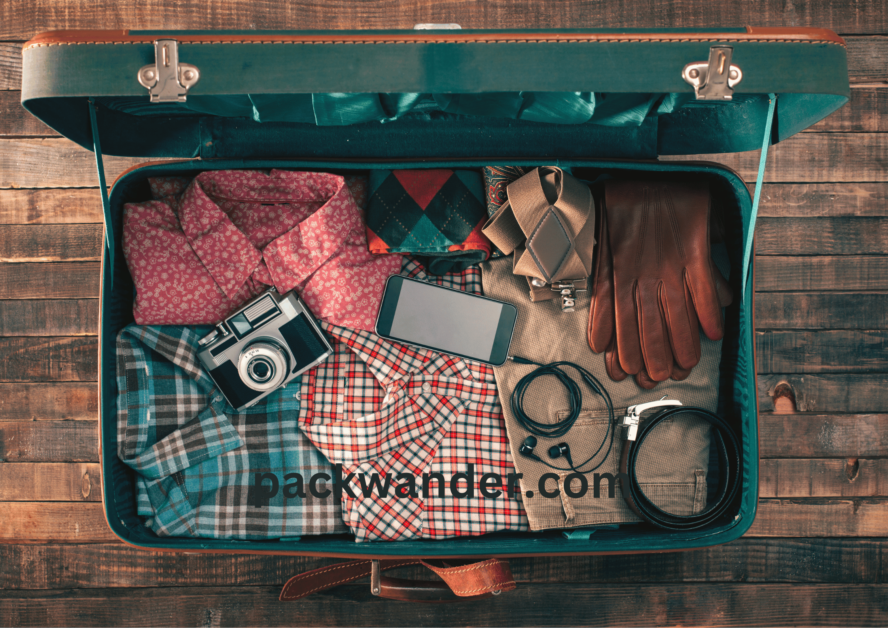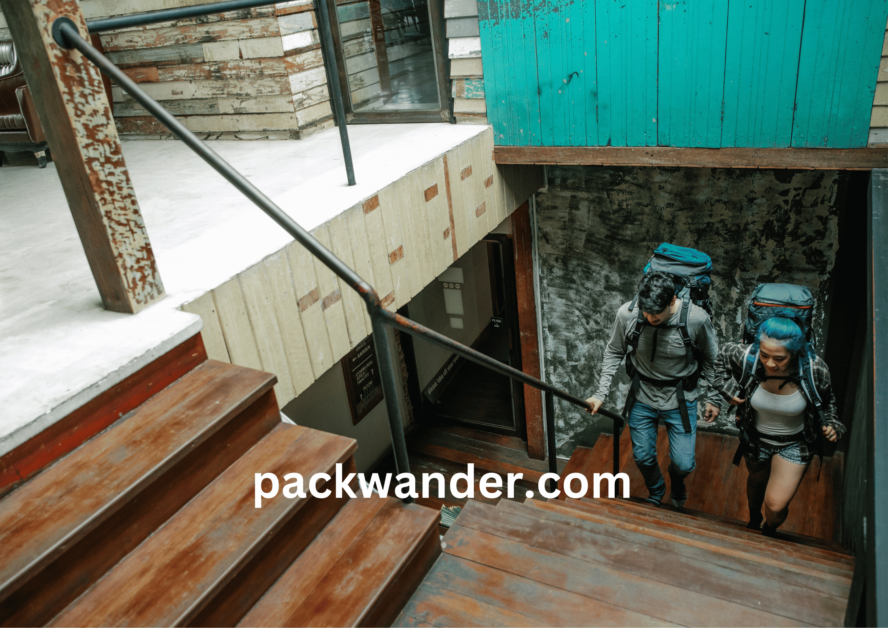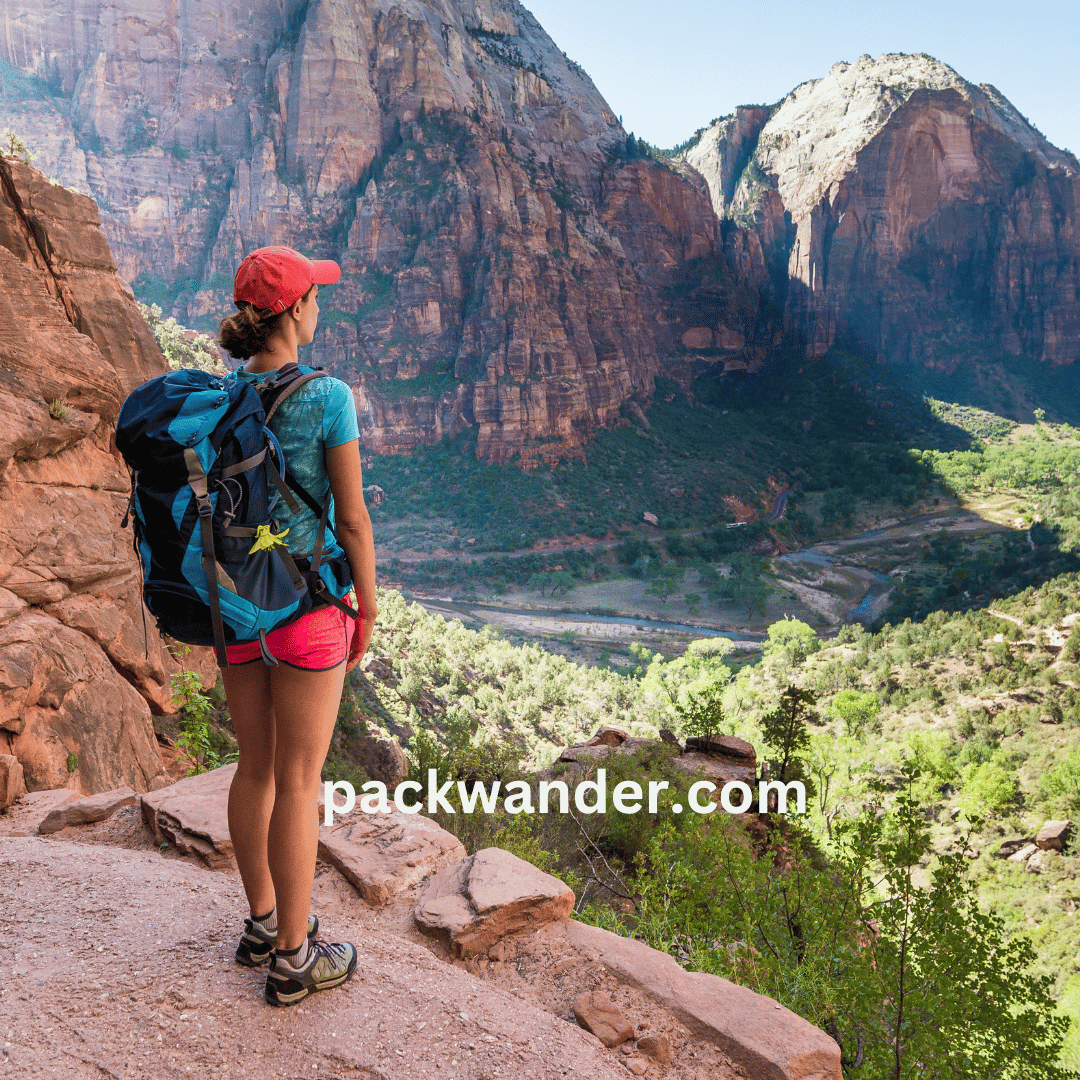What is Backpacking? A Guide to Adventurous Travel and Exploration
Introduction: Exploring the World Through Backpacking
Traveling has become easier than ever, and a new way of exploring has appeared. It’s about the excitement of the unknown and the freedom to choose your own path. This exciting journey is called backpacking, a dynamic and immersive way to travel the world. As cities buzz with activity and wide landscapes stretch before us, backpacking has become incredibly popular. It attracts adventurers and wanderers who want more than just a regular vacation. In this article, we’ll dig into the heart of backpacking and explain its key features that have captured the interest of both young and old explorers.
Setting Out on the Self-Sufficiency Path: At the core of backpacking is a simple idea: carrying everything you need on your back. Unlike regular travel with heavy suitcases and detailed plans, backpacking is about keeping things simple and being self-sufficient. Imagine walking through old streets or hiking along tough mountain trails with only a reliable backpack. This bag holds not just your essentials, but also a feeling of freedom—to go wherever your curiosity takes you. By leaving behind unnecessary baggage, both physical and metaphorical, backpackers enter a world full of possibilities.
Discovering the Spirit of Adventure: Backpacking is more than just going to typical tourist spots. It invites adventurers to go off the usual path, to find hidden treasures far from the usual tourist guides. Backpacking isn’t just a way to get from one place to another; it’s a way of thinking that opens doors to exciting discoveries. Whether you’re exploring busy local markets, finding peaceful countryside getaways, or hiking to faraway viewpoints, each step adds to your unique and personal adventure.
what is backpacking?
Backpacking is a style of travel where individuals explore new places with their essentials carried in a backpack, emphasizing self-sufficiency, adventure, and immersion in different cultures and environments.
Diving into Different Cultures and Environments: Beyond the details of travel, backpacking invites you to really experience the diverse cultures and places that make up our world. Backpackers become temporary locals, sharing glances, smiles, and stories with people whose lives intersect with their journey. Language barriers become bridges, and trying new foods turns into delightful sensory experiences. By embracing this sharing of cultures, backpackers gain a deep understanding of the global community and their role within it.
As we begin our journey to explore the many sides of backpacking, join us as we dive into the core aspects of self-sufficiency, the adventurous spirit, and the joy of cultural sharing.
The Essence of Backpacking:
Backpacking is a special way of traveling that’s different from regular vacations. It’s about exploring the world in a simpler and more independent way. Let’s talk about what makes backpacking unique.
What is Backpacking and Its Important Traits: Backpacking is when people travel with just a backpack. They pack only the necessary things, not extra stuff. This lets them move around easily, whether they’re walking in busy cities or hiking in the wild outdoors.
Being Independent: The Key to Backpacking: In backpacking, people take care of themselves. They carry everything they need in their backpacks, like clothes, food, and sometimes even things to cook with. This helps them become more self-reliant and connected to nature and the places they visit.
Why People Go Backpacking: Seeking Adventure, Learning, and Making Friends: Why do people choose backpacking? It’s because they want to discover new things, have exciting experiences, and grow as individuals. Backpackers love exploring places that aren’t usually visited by tourists. They also enjoy meeting and getting to know people from different cultures. This helps them learn about the world and make new friends.
Backpacking is also about being mindful. Without too much stuff and rigid plans, backpackers can focus on the present moment and enjoy what’s around them. This can lead to better understanding themselves and appreciating the beauty of the world.
As we learn more about backpacking, we find out that it’s not just about reaching a destination. It’s about enjoying the journey itself. The simple way of traveling, the ability to take care of oneself, and the excitement of exploring all come together to create the backpacking experience. In the next parts, we’ll talk more about the practical side of backpacking, giving you useful information to start your own adventure of learning, growing, and making connections with different cultures.
The Adventure of Backpacking:
When you go backpacking, you’re in for a real adventure! It’s not just about going to a place, it’s about the exciting journey to get there. Backpacking brings a special kind of fun that regular travel might not have. Let’s talk about this exciting feeling and share some cool stories that show what it’s all about.

Going Where Others Haven’t: With backpacking, you can explore places that aren’t famous for tourists. You get to find hidden spots that not many people know about. Imagine being in a big, lush forest, finding old ruins hidden in the trees, or discovering a cute village between tall mountains. Backpackers are like modern explorers, always curious and wanting to find new things.
Being OK with Not Knowing Everything: When you go backpacking, it’s okay not to have everything planned out perfectly. You can change your plans and do things on the spot. Like maybe you decide to go to a cool village you didn’t know about, or you wake up early to see a beautiful sunrise. Backpacking lets you enjoy surprises and make fun choices as you go.
Cool Stories about Backpacking Adventures: Picture this: You’re in a busy market in Morocco, talking with sellers about colorful fabrics you want to bring back home. Or imagine sitting on a hill in New Zealand, looking at the stars in the night sky, far from the city lights. These are the stories that show how cool backpacking can be.
Here’s another story: A backpacker is walking in a busy place in Vietnam and finds a super cool restaurant by accident. They try new foods that taste amazing! Another traveler goes to a festival in India, where people are celebrating and having a good time.
These stories show how exciting and unexpected backpacking can be. They show that trying new things and meeting new people makes the adventure awesome.
Remember, when you go backpacking, it’s not just about the places you see. It’s about the fun things you do along the way—like changing your plans, facing challenges, and collecting stories. Backpacking teaches us that the most exciting adventures often happen when we try something different. So, whether you’re climbing mountains, walking in deserts, or exploring cities, always be ready for a big adventure!
Backpacking vs. Regular Travel: What Makes Them Different
When people explore the world, they can do it in two main ways: backpacking and regular travel. These ways are special and have their own good parts. Let’s look closer at what makes them different and why backpacking is cool.
Backpacking: The Special Way to Go
Backpacking is like an adventure. You put your things in a backpack and go to different places. It’s about the journey more than the end place. Regular travel is usually about suitcases, plans, and staying in nice hotels. With backpacking, you can be more flexible and choose where to go as you go along.
Regular Travel: The Usual Way
Regular travel is what most people do. You plan your trip, book hotels, and follow a schedule. You might go to famous tourist places and try popular things. It’s comfortable and organized, but sometimes it feels like you’re following a list.
The Good Parts of Backpacking:
- Adventure that Saves Money: Backpacking can be cheaper. You don’t spend a lot on fancy hotels or expensive food. You can stay in cheaper places and make your own meals. This way, you have more money for fun things.
- Real and True: Backpacking lets you see a place like a local. You can meet people from different countries, taste their foods, and learn how they do things. You get to know the real side of a place, not just the things tourists do.
- Learning More About Cultures: Backpacking helps you understand a culture better. You talk more with local people and learn how they live. You might even learn a bit of a new language!
- Being Flexible and Spontaneous: When you backpack, you can change your plans easily. You might decide to stay longer in a place you love or find cool spots that aren’t in guidebooks.
- Making Friends and Memories: Backpacking often helps you make great friends. When you stay in hostels or camp, you meet other travelers who also like adventures.
Conclusion: Finding Your Own Way
So, which way is better? It depends on what you like. If you like plans and comfort, regular travel might be good. But if you want a real adventure, where you can meet people, try new things, and make good memories, then backpacking is awesome. Both ways have good things, and you can choose what works for you and the kind of adventure you want to have in this big, amazing world.
What to Pack for Backpacking: Your Simple Guide
When you’re getting ready for a backpacking adventure, knowing what to bring is really important. You want to be ready for anything, but you also need to keep things light and easy to carry. Let’s break it down and give you some smart tips for packing well.

Clothes: Dress Wisely and Lightly
- Layers Help: Pack clothes that you can wear on top of each other. This way, you can add or take off layers if the weather changes.
- Mix and Match: Choose clothes that can work together in different ways. A few basic tops and bottoms can make different outfits.
- Good Shoes: Bring shoes that are comfortable for walking. A wide variety of pairs is unnecessary.
- Stay Dry: Don’t forget a light raincoat. In the event of rain, this item has the ability to ensure your protection from getting wet.
- Cozy Pajamas: Pack comfy clothes to sleep in so you can rest well.
Essentials and Gear: Be Ready
- Backpack: Get a good backpack that fits well and can carry all your things.
- Sleeping Stuff: Depending on your trip, bring a light sleeping bag and a small pad to sleep on.
- Find Your Way: Take a map, a compass, or a GPS device to help you know where you are.
- First Aid Kit: Always have basic medical things like bandages, medicine for pain, and any medicine you need.
- Stay Hydrated: Carry a water bottle you can use again and again. Also, something to clean water if you need it.
- Cooking Things: If you want to cook, bring a small stove, a pot, and some light utensils.
- Light at Night: Bring a small flashlight or a lamp for when it’s dark.
Packing Smartly: Use Your Space Well
- Roll Your Clothes: Rolling your clothes makes them take up less space and not get too wrinkled.
- Pack Neatly: Use special bags to keep your things tidy and easy to find.
- Don’t Bring Too Much: Just bring the things you really need, like toothpaste, a toothbrush, and a bit of soap.
- Small Toiletries: Pick small bottles of things to save space and weight.
- Wear Big Stuff: If you have heavy or big things like boots or a jacket, wear them when you’re traveling to save space in your backpack.
- Plan Your Clothes: Think about what you’ll wear and plan ahead to avoid bringing too much.
- Check Your Bag: Before you go, make sure your backpack is comfortable and not too heavy.
In Conclusion: Pack Well, Travel Light
Packing for backpacking is like solving a puzzle. You want to bring what you need without making your bag too heavy. Pick clothes that work together, important things, and good packing tricks. When you pack well, your backpacking trip will be easier and more fun. Now go on, pack your bag, and get ready for an amazing adventure!
Finding a Place to Sleep: Your Simple Guide to Backpacker Accommodation
When you’re backpacking, where you sleep is a big deal. There are a few choices that fit well with backpacking. Let’s see where you can stay and how to pick the best one for your adventure.

Kinds of Places to Stay:
- Hostels: These are like cheap hotels. You get a bed in a room with other travelers. It’s good for meeting people and saving money.
- Camping: If you like nature, camping is a nice option. You bring a tent and sleep outside. It’s fun and pretty.
- Budget Places: These are simple and not too expensive. You might get your own room or share with a few people.
Choosing and Booking a Place:
- Where is it?: Think about where you want to be. Is it close to cool stuff you want to do? Pick a place that’s easy to go from.
- What Others Say: Read what other travelers think about a place. Their stories can help you decide if it’s good.
- Price Tag: Decide how much you want to spend and look for places that fit your budget.
- Stuff They Have: Check what the place gives you. Do they have Wi-Fi, a kitchen, or other things you need?
- How’s the Vibe?: Think about the feeling of the place. Some are quiet, while others are more social. Choose what feels right.
- Booking: Once you find a place you like, book it ahead, especially when it’s busy. You can do it online or when you get there.
Being a Good Guest:
- Follow Rules: Do what the place asks. Be quiet when it’s time to be quiet and clean up your things.
- Make Friends: Backpacking is about meeting new people. Say hi to others and make friends.
- Stay Safe: Keep your stuff safe and lock your door when you’re not there.
In Conclusion: Your Home Away from Home
No matter where you stay, remember that your place to sleep is like a home during your adventure. It’s where you rest, make friends, and get ready for the next day. By picking the right place and being a nice guest, you’ll make your backpacking time even more fun. So, find your cozy spot, and get ready for some awesome adventures!
Understanding Other Cultures: How Backpacking Helps
Backpacking is more than traveling to new places. It’s also about getting to know the people and how they live. When you go backpacking, you can really become a part of the local community and learn about their way of life. Let’s see how this works and hear some stories that show how great it can be.

Getting Close to Local Cultures:
- Living Like Locals: Backpackers often stay where local people live. This lets you see how they go about their daily lives.
- Trying Local Food: When you go backpacking, you can eat the same food that locals do. You might taste foods you’ve never had before.
- Speaking Their Language: Learning a few words of the local language can help you talk to people and show that you respect their culture.
- Joining Traditions: Taking part in local celebrations, festivals, or customs can help you really experience the culture.
Special Moments with Different Cultures:
- Sharing Stories: Backpacking is a chance to meet people from different places. You can talk and learn about each other’s lives.
- Local Friends: Sometimes, backpackers become friends with locals who show them around and introduce them to cool things.
- Learning New Things: You might learn new skills or crafts from locals, like cooking their traditional food or making souvenirs.
Stories About Connecting with Cultures:
- Cooking Class in Thailand: A person backpacking in Thailand joined a cooking class with a local family. They learned to make traditional Thai dishes and had a fun time eating together.
- Dancing in Brazil: While backpacking in Brazil, someone joined a dance class with locals. Dancing together not only improved their dancing but also helped them understand Brazilian culture better.
- Staying in an Indian Village: One backpacker chose to stay in a small village in India. They helped with daily tasks, ate with the villagers, and shared stories, making lasting friendships.
In Conclusion: Bringing People Together Through Backpacking
Backpacking isn’t just about going on a trip. It’s a way to connect with people from different parts of the world. By doing things together, having heartfelt talks, and being open to new ways, you can break down barriers between cultures and make lasting friends. These experiences make your journey better and also leave a positive mark on the communities you visit. So, when you go backpacking, remember that the connections you make are just as important as the places you see.
Being Kind to the Environment: Responsible Backpacking
When we go backpacking, we’re not just exploring new places; we’re also taking care of our planet. It’s really important to be responsible and make sure our adventures don’t harm the environment. Let’s talk about why this matters and how we can be good backpackers while protecting nature.

Why Responsible Backpacking Matters:
- Preserving Nature: When we explore beautiful places, we want to keep them beautiful for others to enjoy. Responsible backpacking helps protect the environment.
- Respecting Locals: People in different places have their own ways of living. Being responsible means we respect their traditions and customs.
- Setting an Example: When we show others how to be responsible, they’ll do the same. This creates a positive chain reaction.
How to Be a Responsible Backpacker:
- Leave No Trace: Adhere to the Leave No Trace guidelines. This means not leaving any trash behind, not damaging plants, and keeping nature clean.
- Use Resources Wisely: Don’t waste water, electricity, or other resources. Use only what you need.
- Stay on Trails: Stick to designated paths to avoid harming plants and wildlife.
- Reduce Waste: Bring reusable items like water bottles and bags. Avoid single-use plastics.
- Respect Local Culture: Learn about the customs and traditions of the place you’re visiting. Be respectful and considerate.
Stories of Responsible Backpacking:
- Cleaning Up After Ourselves: A group of backpackers organized a cleanup in a popular hiking spot. They collected trash left behind by others, leaving the area cleaner than they found it.
- Learning from Locals: While backpacking in a foreign country, a traveler learned about the local way of life and followed their customs, showing appreciation for the culture.
- Sustainable Choices: A backpacker brought a reusable water bottle, shopping bag, and utensils. They avoided using plastic and inspired others to do the same.
Conclusion: Our Role in Protecting Nature
Backpacking is an amazing way to explore, learn, and have fun. But it comes with a responsibility—to take care of the places we visit. By practicing responsible backpacking, we can make a positive impact on the environment and the people who call those places home. Let’s be conscious of our actions, leave nothing behind, and show the world that backpacking can be both adventurous and environmentally friendly. Remember, every small effort counts, and together we can ensure that future generations can enjoy the wonders of the world, just as we do today.
Summing It Up: Your Backpacking Adventure
In our journey about backpacking, we learned a lot. Backpacking is a special way to explore the world. It’s about being independent, discovering new things, and connecting with different cultures. Let’s remember the important things we talked about:
- What is Backpacking: Backpacking means traveling in an exciting way. It’s not just about going places, but also about understanding cultures and trying new things.
- The Exciting Part: Backpacking is like an adventure. It’s about exploring places that are not so common and being open to surprises.
- Backpacking vs. Regular Travel: Backpacking is different from regular travel. It can save money, let you experience real life, and help you make friends.
- Packing Smartly: We talked about what to pack for a backpacking trip and how to pack efficiently.
- Getting to Know Cultures: Backpacking lets you become a part of other cultures. You can taste new foods, learn about traditions, and make friends from around the world.
- Taking Care of Nature: We also learned about being responsible. It’s important to keep the places we visit clean and show respect for local customs.
Embracing Adventure:
Remember, backpacking is not just about where you go. It’s about the exciting stories you collect, the friendships you build, and how you become a better person.
Your Turn to Explore:
Whether you’ve backpacked before or not, think about giving it a try. Pack your bag, be ready to learn, and set out on a journey that will make your life richer and more interesting. As you travel, may your backpack be light, and may you discover the joy of backpacking.
Additional Tips: Backpacking Tips for Beginners
As you gear up for your first backpacking adventure, here are some extra tips to make your journey even smoother. Let’s make sure you’re fully prepared for the exciting adventure ahead!
- Start with Short Trips: If you’re new to backpacking, begin with shorter trips to get a feel for it. Weekend getaways or day hikes are excellent ways to ease into the backpacking experience.
- Choose Familiar Destinations: Opt for destinations you’re somewhat familiar with. This way, you’ll feel more comfortable navigating and understanding the local culture.
- Break in Your Gear: Before your trip, wear your backpack and shoes around to break them in. This will prevent discomfort during your adventure.
- Practice Packing: Do a trial packing run at home. This helps you organize your stuff efficiently and ensures you’re not carrying unnecessary items.
- Stay Hydrated and Nourished: Pack lightweight, energy-rich snacks to keep you fueled during hikes. Maintaining proper hydration is of utmost importance, thus it’s recommended to have a reusable water bottle on hand.
- Learn Basic Navigation: Familiarize yourself with reading maps, using a compass, or GPS apps. This skill can be a lifesaver in unfamiliar terrain.
- Safety First: Research the area you’re visiting and be aware of potential risks. Inform someone about your intentions and provide an approximate time of your expected return.
- Pack a First Aid Kit: Include basics like bandages, pain relievers, and any personal medications you may need. so pack your medications bag.
- Respect Nature: Always follow Leave No Trace principles. Be careful not to disturb wildlife, and stick to marked trails to protect the environment.
- Connect with Other Backpackers: Join online forums or social media groups where experienced backpackers share tips and stories. Valuable insights can be gained from their personal encounters.







